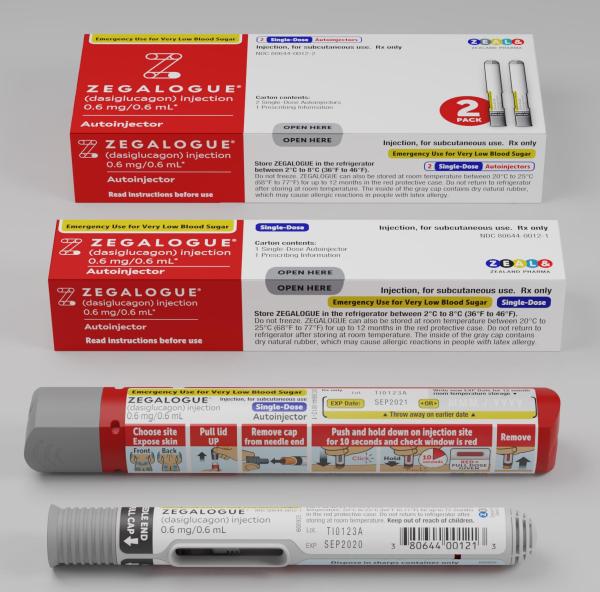Zegalogue Disease Interactions
There are 3 disease interactions with Zegalogue (dasiglucagon).
Glucagon (applies to Zegalogue) insulinoma
Major Potential Hazard, Moderate plausibility.
The use of glucagon is contraindicated in patients with insulinoma or glucagonoma as it may cause secondary hypoglycemia. Test patients suspected of having glucagonoma for blood levels of glucagon prior to treatment, and monitor for changes in blood glucose levels during treatment. If a patient develops symptoms of hypoglycemia after a dose of glucagon, administer glucose orally or intravenously.
Glucagon (applies to Zegalogue) pheochromocytoma
Major Potential Hazard, Moderate plausibility.
The use of glucagon is contraindicated in patients with pheochromocytoma because glucagon may stimulate the release of catecholamines from the tumor, which may result in a sudden and marked increase in blood pressure.
Glucagon (applies to Zegalogue) glycogen depletion
Moderate Potential Hazard, Moderate plausibility. Applicable conditions: Adrenal Insufficiency, Malnourished, Panhypopituitarism
Glucagon reverses hypoglycemia via mobilization of hepatic glycogen. It is not useful for treating hypoglycemic patients who are glycogen-depleted, a condition that can occur in starvation, adrenal insufficiency, or chronic hypoglycemia. Glucose administration should be considered in such cases.
Switch to professional interaction data
Zegalogue drug interactions
There are 24 drug interactions with Zegalogue (dasiglucagon).
More about Zegalogue (dasiglucagon)
- Zegalogue consumer information
- Check interactions
- Compare alternatives
- Pricing & coupons
- Drug images
- Side effects
- Dosage information
- During pregnancy
- FDA approval history
- Drug class: glucose elevating agents
- Breastfeeding
Related treatment guides
Drug Interaction Classification
| Highly clinically significant. Avoid combinations; the risk of the interaction outweighs the benefit. | |
| Moderately clinically significant. Usually avoid combinations; use it only under special circumstances. | |
| Minimally clinically significant. Minimize risk; assess risk and consider an alternative drug, take steps to circumvent the interaction risk and/or institute a monitoring plan. | |
| No interaction information available. |
See also:
Further information
Always consult your healthcare provider to ensure the information displayed on this page applies to your personal circumstances.


